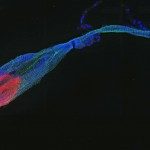Lien vers Pubmed [PMID] – 11288513
Rev. - Off. Int. Epizoot. 2001 Apr;20(1):21-54
Tuberculosis, caused by Mycobacterium tuberculosis, and leprosy, caused by M. leprae, are diseases known since antiquity. In developing countries, tuberculosis is still the leading cause of mortality due to an infectious disease. Taxonomically, mycobacteria belong to the genus Mycobacterium, which is the single genus within the family of Mycobacteriaceae, in the order Actinomycetales. Actinomycetales include diverse micro-organisms, but mycobacteria and allied taxa are easily distinguished on the basis of the ability to synthesise mycolic acids. Mycobacterial species are traditionally differentiated on the basis of phenotypic characteristics, and the authors provide an updated list of the biochemical tests currently employed and the culture properties that help to discriminate among various species of mycobacteria. However, as the phenotypic characteristics do not allow precise identification of all species, recent molecular taxonomical approaches for mycobacterial classification and phylogeny are also described. Mycobacteria are also a leading cause of infection in various domesticated animals and wildlife. The authors briefly describe the mycobacteria involved in animal infections, the wildlife reservoirs and strategies to control bovine tuberculosis, and the use of molecular tools for diagnostics and epidemiology of mycobacterial infections in animals. The characteristic of intracellular parasitism is discussed, in addition to the fate of pathogenic mycobacteria that have the ability to grow inside phagosomes and phagolysosomes of infected host macrophages. The mycobacterial cell envelope, which is a complex tripartite structure containing a high proportion of lipids (approximately 30% to 40% of the total weight) could play a crucial role in the adaptation of mycobacteria to intracellular growth and survival, immune modulation and drug resistance.

